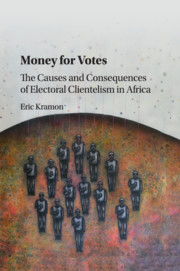Book contents
- Frontmatter
- Contents
- List of Tables
- List of Figures
- Acknowledgments
- Part I The Puzzle of Electoral Clientelism
- Part II Empirical Evidence
- 4 The Mechanics of Electoral Clientelism: Descriptive Evidence
- 5 Why is Electoral Clientelism Effective?: Experimental Evidence
- 6 Who Invests in Electoral Clientelism?: Incumbents versus Challengers
- 7 Electoral Clientelism and Ethnic Politics
- 8 Electoral Clientelism and the Provision of Local Public Goods
- 9 Conclusion
- Appendices
- Bibliography
- Index
5 - Why is Electoral Clientelism Effective?: Experimental Evidence
from Part II - Empirical Evidence
Published online by Cambridge University Press: 26 October 2017
- Frontmatter
- Contents
- List of Tables
- List of Figures
- Acknowledgments
- Part I The Puzzle of Electoral Clientelism
- Part II Empirical Evidence
- 4 The Mechanics of Electoral Clientelism: Descriptive Evidence
- 5 Why is Electoral Clientelism Effective?: Experimental Evidence
- 6 Who Invests in Electoral Clientelism?: Incumbents versus Challengers
- 7 Electoral Clientelism and Ethnic Politics
- 8 Electoral Clientelism and the Provision of Local Public Goods
- 9 Conclusion
- Appendices
- Bibliography
- Index
Summary
This book argues for a shift in the way scholars often think about electoral clientelism during elections. Instead of focusing on electoral handouts as purely an element of direct exchange between candidate and voter, I argue that more attention should be paid to the signals handouts convey. Just as individuals often give one another gifts to signal goodwill, generosity, and awareness of social responsibility, I argue that politicians in Africa and elsewhere often distribute electoral handouts to signal to voters that they will represent their interests and distribute resources to them in the future. In short, electoral handouts are not always transactional: they can also be informational.
This chapter tests a central assumption of this theory: that electoral clientelism sends a credible signal to voters. Two challenges present obstacles to the empirical evaluation of this assumption. First is the problem of response bias. If we ask individuals what they think about candidates who distribute electoral handouts, they may give socially desirable answers which conform to norms that suggest that distributing handouts is immoral. The second challenge is presented by voters’ cognitive constraints. Individuals in all environments have difficulty identifying the determinants of their beliefs and behaviors, most of which result from complex cognitive processes about which they are often only partly aware (Nisbett and Wilson, 1977). Thus, even if individuals are trying to be honest, they may have difficulty to accurately explain the sources of their beliefs about political candidates. To overcome these challenges, I analyze data collected from a set of field experiments. These experiments, which were conducted with 1,000 randomly selected participants in two regions of Kenya, present participants with radio recordings describing hypothetical political candidates.
The recordings manipulate information about the candidate's engagement in electoral clientelism—in some recordings, the candidate distributes electoral handouts and in some he does not. As this information is subtle and randomly assigned to participants—ensuring that the only difference between the recordings and the populations in each experimental group is the short reference to electoral handouts—I am able to determine how electoral handouts influence electoral support and to identify the informational content of their signals. The results provide evidence that corroborates the informational theory.
- Type
- Chapter
- Information
- Money for VotesThe Causes and Consequences of Electoral Clientelism in Africa, pp. 95 - 119Publisher: Cambridge University PressPrint publication year: 2017



